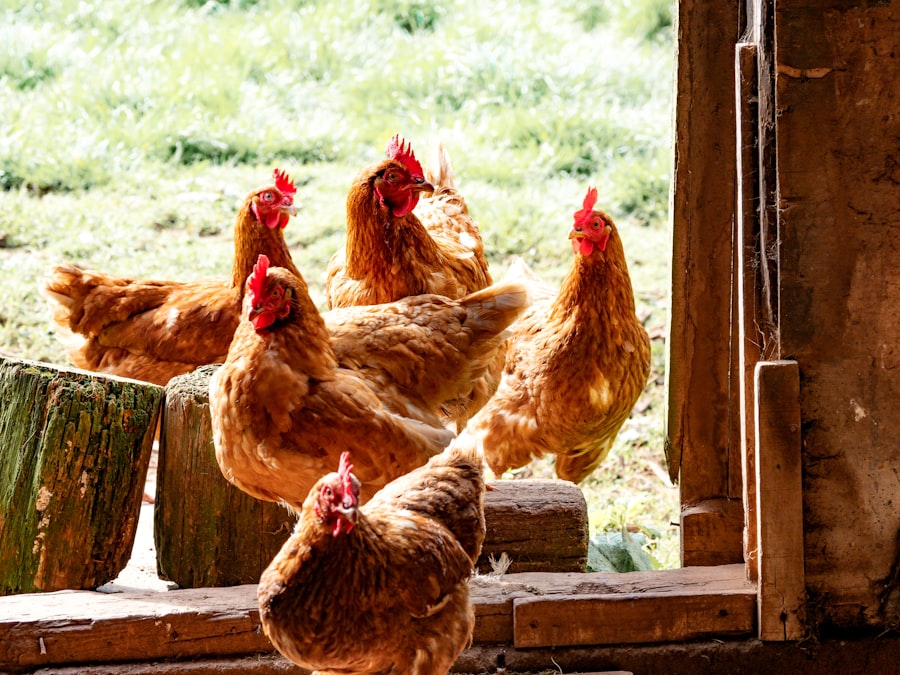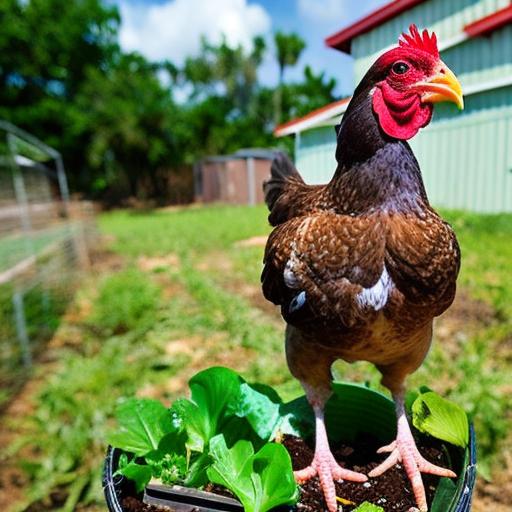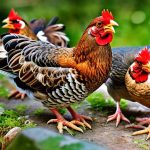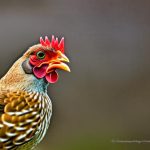Keeping chickens has become increasingly popular in Brevard County, Florida. Many residents are embracing the idea of raising their own chickens for fresh eggs, meat, and the numerous benefits that come with it. Personally, I have been keeping chickens on my property for several years now and have found it to be a rewarding and enjoyable experience.
Key Takeaways
- Keeping chickens on your property in Brevard County can provide numerous benefits, including fresh eggs, natural pest control, and fertilizer for your garden.
- Before starting your chicken-keeping journey, it’s important to familiarize yourself with the regulations and zoning laws in Brevard County to ensure you are in compliance.
- Choosing the right chicken breeds for your property is crucial for their health and productivity, and factors such as climate and space should be taken into consideration.
- Designing and building a chicken coop in Brevard County requires careful planning and attention to detail, including proper ventilation, insulation, and predator-proofing.
- Maintaining a clean and healthy chicken coop involves regular cleaning, providing fresh bedding and water, and monitoring for signs of illness or disease.
Benefits of Raising Chickens on Your Property
One of the main benefits of keeping chickens is the access to fresh eggs and meat. There is nothing quite like collecting eggs from your own backyard and knowing exactly where they came from. The taste and quality of homegrown eggs are far superior to store-bought ones. Additionally, raising your own chickens for meat ensures that you know exactly how they were raised and what they were fed.
Another benefit of keeping chickens is the fertilizer they provide for your garden. Chicken manure is rich in nutrients and can greatly improve the quality of your soil. By allowing your chickens to roam freely in your garden or using their manure as compost, you can create a sustainable and organic way to nourish your plants.
Raising chickens also provides educational opportunities for children. They can learn about responsibility, animal care, and where their food comes from. It teaches them about the circle of life and the importance of sustainable living. It is a hands-on experience that can be both fun and educational.
Regulations and Zoning Laws for Keeping Chickens in Brevard County
Before starting your own flock, it is important to familiarize yourself with the regulations and zoning laws regarding keeping chickens in Brevard County. These regulations vary depending on the specific area within the county, so it is essential to check with your local government or zoning department.
In general, Brevard County allows residents to keep a limited number of chickens on their property as long as certain conditions are met. These conditions typically include restrictions on the number of chickens allowed, the distance of the coop from neighboring properties, and the cleanliness and maintenance of the coop.
To ensure compliance with these regulations, it is advisable to obtain any necessary permits or licenses. This may involve submitting an application, paying a fee, and undergoing an inspection of your property and chicken coop. It is important to follow these regulations to avoid any potential fines or legal issues.
Choosing the Right Chicken Breeds for Your Property
When choosing chicken breeds for your property in Brevard County, there are several factors to consider. First, you need to determine whether you want chickens primarily for egg production, meat production, or both. Different breeds have different strengths in these areas.
For egg production, popular breeds include Rhode Island Reds, Leghorns, and Australorps. These breeds are known for their high egg production and reliability. If you are interested in meat production, breeds such as Cornish Cross and Freedom Rangers are commonly used.
It is also important to consider the climate in Brevard County when choosing chicken breeds. The hot and humid weather can be challenging for some breeds, so it is advisable to select breeds that are heat-tolerant. Breeds such as the Black Australorp and the Sussex are known for their ability to handle hot climates.
Designing and Building a Chicken Coop in Brevard County
When designing a chicken coop in Brevard County, it is important to ensure that it meets the regulations set by the county. The coop should be well-ventilated, secure from predators, and provide enough space for the number of chickens you plan to keep.
Materials needed for building a chicken coop include lumber for framing, wire mesh for fencing, roofing materials, and nesting boxes. It is important to use materials that are durable and weather-resistant to ensure the longevity of the coop.
Tools needed for building a chicken coop include a saw, hammer, drill, and measuring tape. It is also helpful to have a level and a square to ensure that the coop is built correctly and securely.
Tips for Maintaining a Clean and Healthy Chicken Coop

Maintaining a clean and healthy chicken coop is essential for the well-being of your chickens. A clean coop helps prevent the spread of diseases and parasites, and it also keeps your chickens comfortable and happy.
Regular cleaning of the coop is important. This includes removing soiled bedding, cleaning the nesting boxes, and scrubbing the floors and walls. It is also important to regularly check for any signs of pests or diseases and take appropriate measures to address them.
Providing proper ventilation in the coop is crucial for maintaining a healthy environment. Good airflow helps prevent the buildup of ammonia from chicken waste and keeps the coop dry and odor-free.
Feeding and Watering Your Chickens in Brevard County
Proper nutrition and hydration are essential for the health of your chickens. There are various types of feed available for chickens, including commercial feeds, organic feeds, and homemade feeds. It is important to choose a feed that meets the nutritional needs of your chickens based on their age and purpose (egg production or meat production).
Waterers should be provided at all times to ensure that your chickens have access to clean and fresh water. It is important to regularly clean and refill the waterers to prevent the growth of bacteria or algae.
Protecting Your Chickens from Predators in Brevard County
Brevard County is home to various predators that pose a threat to chickens, including raccoons, foxes, snakes, and hawks. It is important to take measures to protect your chickens from these predators.
One way to protect your chickens is by ensuring that their coop is secure. This includes using sturdy fencing with small gaps to prevent predators from entering the coop. It is also important to reinforce the coop with hardware cloth to prevent predators from digging under or climbing over the fencing.
Providing a secure and enclosed run for your chickens to roam during the day can also help protect them from predators. This allows them to have access to fresh air and sunlight while still being protected.
Selling Eggs and Other Products from Your Chickens in Brevard County
If you are interested in selling eggs or other chicken products from your property in Brevard County, it is important to familiarize yourself with the regulations regarding selling these products.
In general, selling eggs from your own flock is allowed as long as certain conditions are met. These conditions typically include labeling requirements, refrigeration requirements, and restrictions on the number of eggs that can be sold.
To market and sell your chicken products, it is important to establish a customer base. This can be done through word-of-mouth, local farmers markets, or online platforms. It is also important to ensure that you have proper packaging and labeling for your products.
Enjoying the Rewards of Keeping Chickens on Your Property in Brevard County
Keeping chickens on your property in Brevard County can be a rewarding and fulfilling experience. The benefits of fresh eggs, meat, fertilizer, and educational opportunities make it an attractive option for many residents.
By familiarizing yourself with the regulations and zoning laws, choosing the right chicken breeds, designing and building a chicken coop, maintaining cleanliness and health, providing proper nutrition and hydration, protecting from predators, and understanding the regulations for selling chicken products, you can enjoy all the rewards that come with keeping chickens on your property in Brevard County.
If you’re interested in keeping chickens on your property in Brevard County, you may also want to learn about the mating season for ducks. Understanding when duck mating season occurs can help you plan and prepare for breeding ducks successfully. To find out more about this topic, check out this informative article on Poultry Wizard. Additionally, if you’re looking for tips on building a chicken coop in Chester, SC, or creating a comfortable nest box for your chickens, Poultry Wizard has got you covered. Explore their articles on chicken coop construction in Chester, SC and creating the perfect chicken coop nest box to enhance your poultry-keeping experience.
FAQs
What is Brevard County’s policy on keeping chickens on your property?
Brevard County allows residents to keep chickens on their property as long as they follow certain guidelines and regulations.
How many chickens can I keep on my property in Brevard County?
Residents of Brevard County are allowed to keep up to 10 chickens on their property.
Do I need a permit to keep chickens in Brevard County?
No, residents of Brevard County do not need a permit to keep chickens on their property as long as they follow the guidelines and regulations set forth by the county.
What are the guidelines for keeping chickens in Brevard County?
Some of the guidelines for keeping chickens in Brevard County include keeping the chickens in a secure coop or enclosure, providing adequate food and water, and keeping the coop or enclosure clean and free of odors.
Are there any restrictions on where I can keep my chicken coop in Brevard County?
Yes, there are some restrictions on where you can keep your chicken coop in Brevard County. The coop must be located at least 10 feet from any property line and at least 25 feet from any neighboring residence.
What should I do if my neighbors complain about my chickens?
If your neighbors complain about your chickens, you should try to work with them to address their concerns. If you are unable to resolve the issue, you may need to contact the county to see if there are any additional steps you can take to address the situation.
Meet Walter, the feathered-friend fanatic of Florida! Nestled in the sunshine state, Walter struts through life with his feathered companions, clucking his way to happiness. With a coop that’s fancier than a five-star hotel, he’s the Don Juan of the chicken world. When he’s not teaching his hens to do the cha-cha, you’ll find him in a heated debate with his prized rooster, Sir Clucks-a-Lot. Walter’s poultry passion is no yolk; he’s the sunny-side-up guy you never knew you needed in your flock of friends!







